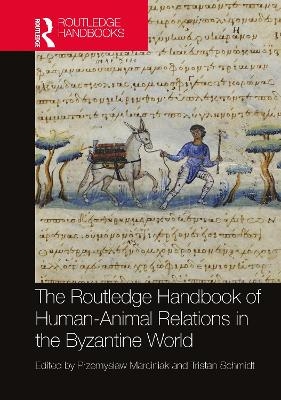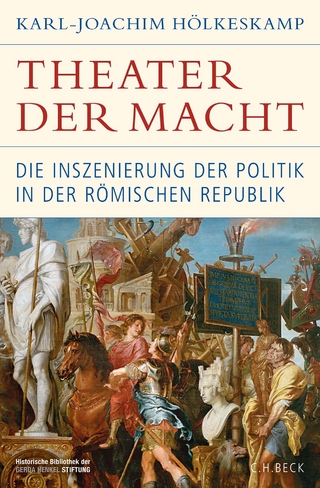
The Routledge Handbook of Human-Animal Relations in the Byzantine World
Routledge (Verlag)
978-0-367-51964-3 (ISBN)
- Lieferbar (Termin unbekannt)
- Versandkostenfrei
- Auch auf Rechnung
- Artikel merken
Animals have recently become recognized as significant agents of history as part of the ‘animal turn’ in historical studies. Animals in Byzantium were human companions, a source of entertainment and food – it is small wonder that they made their way into literature and the visual arts. Moreover, humans defined themselves and their activities by referring to non-human animals, either by anthropomorphizing animals (as in the case of the Cat-Mice War) or by animalizing humans and their (un)wanted behaviours.
The Routledge Handbook of Human-Animal Relations in the Byzantine World offers an in-depth survey of the relationships between humans and non-human animals in the Byzantine Empire. The contributions included in the volume address both material (zooarchaeology, animals as food, visual representations of animals) and immaterial (semiotics, philosophy) aspects of human-animal coexistence in chapters written by leading experts in their field.
This book will appeal to students and scholars alike researching Byzantine social and cultural history, as well as those interested in the history of animals. This book marks an important step in the development of animal studies in Byzantium, filling a gap in the wider research on the history of human-animal relations in the Middle Ages.
Przemysław Marciniak is a Research Professor and the Director of the Center for Byzantine Studies at the University of Silesia in Katowice, Poland. His research focuses on Byzantine performative culture, the reception of Byzantium, and recently on animals and nature in the Byzantine world. His publications include articles on Byzantine entomology and a co-edited volume on the reception of Byzantium in the popular imagination. Tristan Schmidt is Assistant Professor at the University of Silesia in Katowice, Poland. His research is focused on human-nature relations in the Byzantine world as well as on the aristocracy and military leadership between the 11th and 13th centuries in Byzantium. His animal-related publications include a monograph on animal imagery in Byzantine political discourse, and studies on concepts of animal agency in Byzantine texts and on ecological awareness in Byzantine society.
Byzantine Animal Studies – History Beyond Humans
Przemysław Marciniak and Tristan Schmidt
Part 1: What do “They” Mean to “Us”? Theoretical Perspectives on Byzantine Animals
More Than Meets the Eye: The Semiotics of Animals in Byzantium
Tristan Schmidt
Timotheus of Gaza and the Zoological Collection of Constantine VII. Two Byzantine Treatises
Arnaud Zucker
Christianising Animals: Physiologus and Hexaemeral Literature
Stavros Lazaris
Animal Rationality in Byzantine Philosophy and Islamic Philosophy
Bligh Somma and Melpomeni Vogiatzi
Part 2: Literary and Figurative Discourses on Animals
Unsung Heroes of Byzantine Hagiography: The Role of Animals in Martyrs’ Passions
Christodoulos Papavarnavas
Animals in Byzantine Historical Writing
Stephanos Efthymiadis
Animals in Legal Sources
Johannes Koder
Animals in Satire
Kirsty Stewart
Man, Beast and Nature: Descriptions of Hunting in Byzantine Literature
Charis Messis and Ingela Nilsson
Animals in Byzantine Mosaics
Henry Maguire
Animals in Byzantine Manuscripts
Nancy P. Ševčenko
Part 3: Material Animals in Byzantium
Animals as a Source of Food During the Byzantine Period. Dietetic Advice and Dietary Reality.
Maciej Kokoszko and Zofia Rzeźnicka
More than Food – Animal Bone Finds as a Source for Different Research Questions
Henriette Baron
Animals as Diplomatic Gifts: From Species to Political Uses
Nicolas Drocourt
Animals We Love: Pets and Companion Animals in Byzantium?
Przemysław Marciniak
It Was Not Easy Being a Mouse in Constantinople: Some Notes on the Role of Mice in Byzantine Life and Literature
Katarzyna Piotrowska
| Erscheinungsdatum | 22.10.2024 |
|---|---|
| Reihe/Serie | Routledge History Handbooks |
| Zusatzinfo | 26 Halftones, black and white; 26 Illustrations, black and white |
| Verlagsort | London |
| Sprache | englisch |
| Maße | 174 x 246 mm |
| Gewicht | 860 g |
| Themenwelt | Geschichte ► Allgemeine Geschichte ► Altertum / Antike |
| Geschichte ► Allgemeine Geschichte ► Mittelalter | |
| Geisteswissenschaften ► Sprach- / Literaturwissenschaft ► Anglistik / Amerikanistik | |
| Geisteswissenschaften ► Sprach- / Literaturwissenschaft ► Literaturwissenschaft | |
| Sozialwissenschaften ► Ethnologie | |
| Sozialwissenschaften ► Soziologie | |
| ISBN-10 | 0-367-51964-X / 036751964X |
| ISBN-13 | 978-0-367-51964-3 / 9780367519643 |
| Zustand | Neuware |
| Haben Sie eine Frage zum Produkt? |
aus dem Bereich


